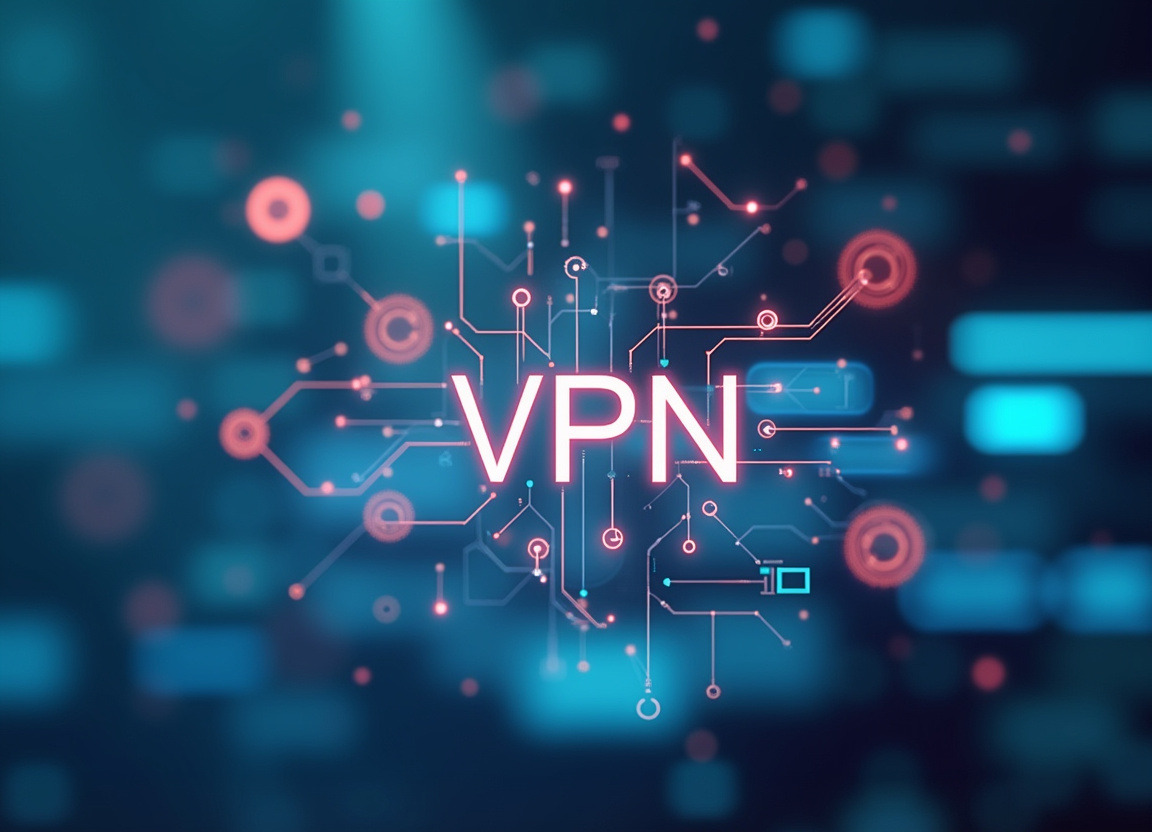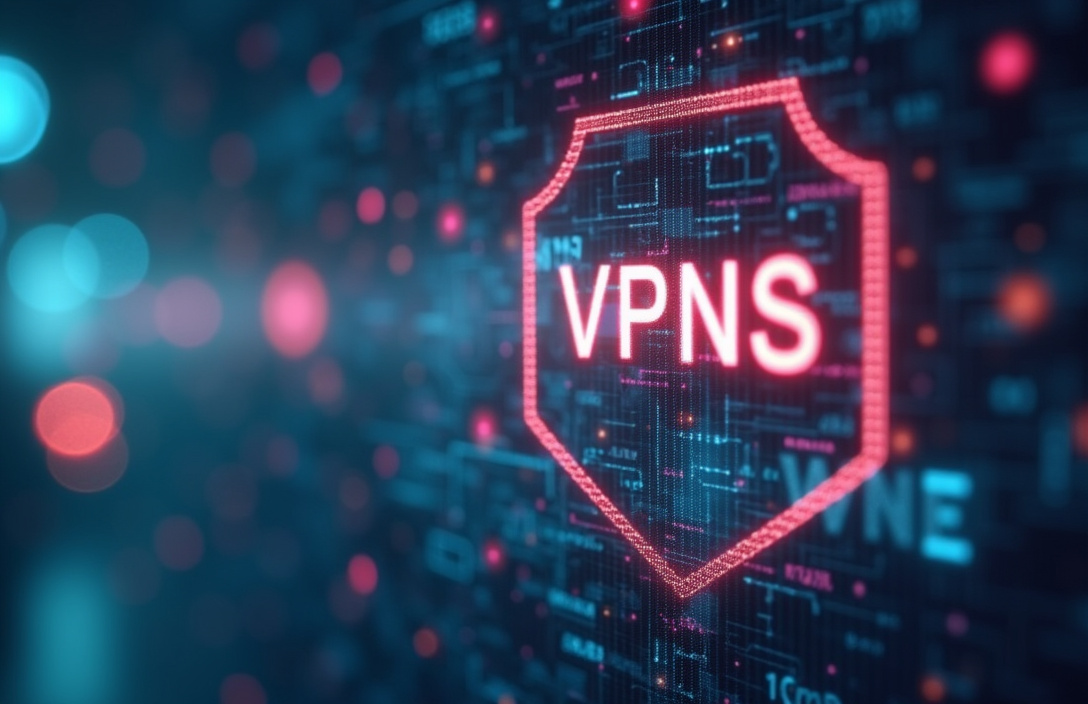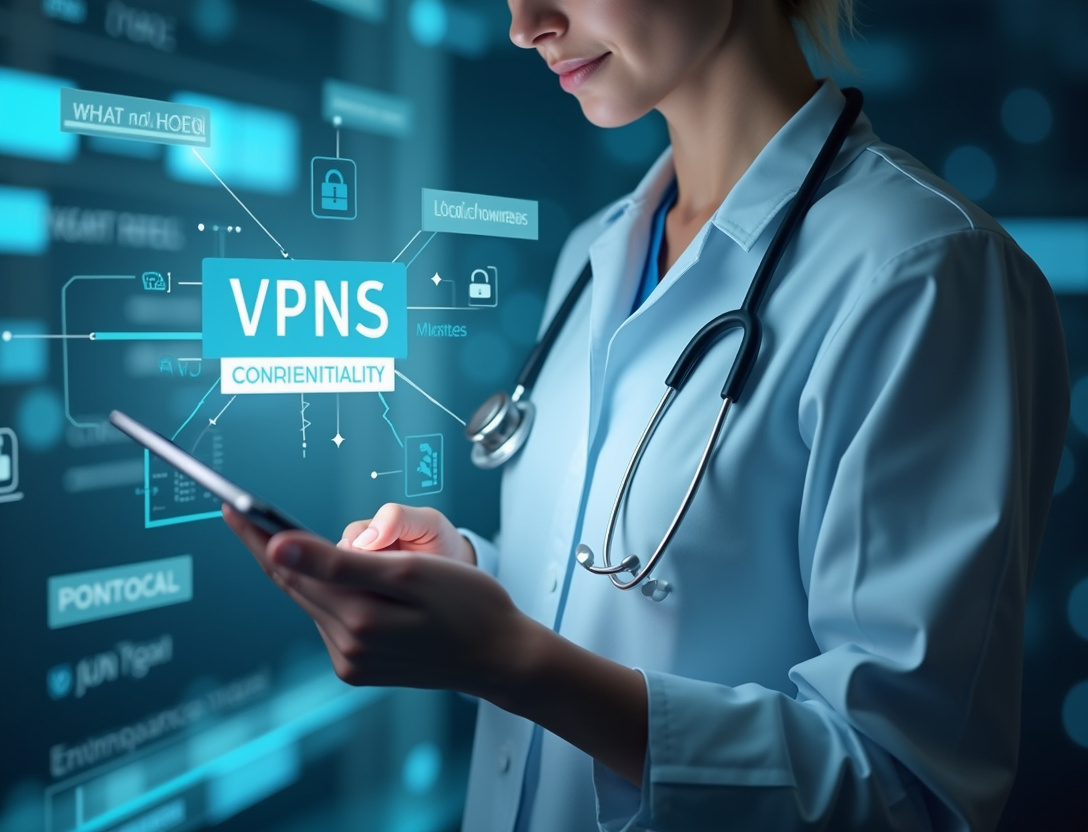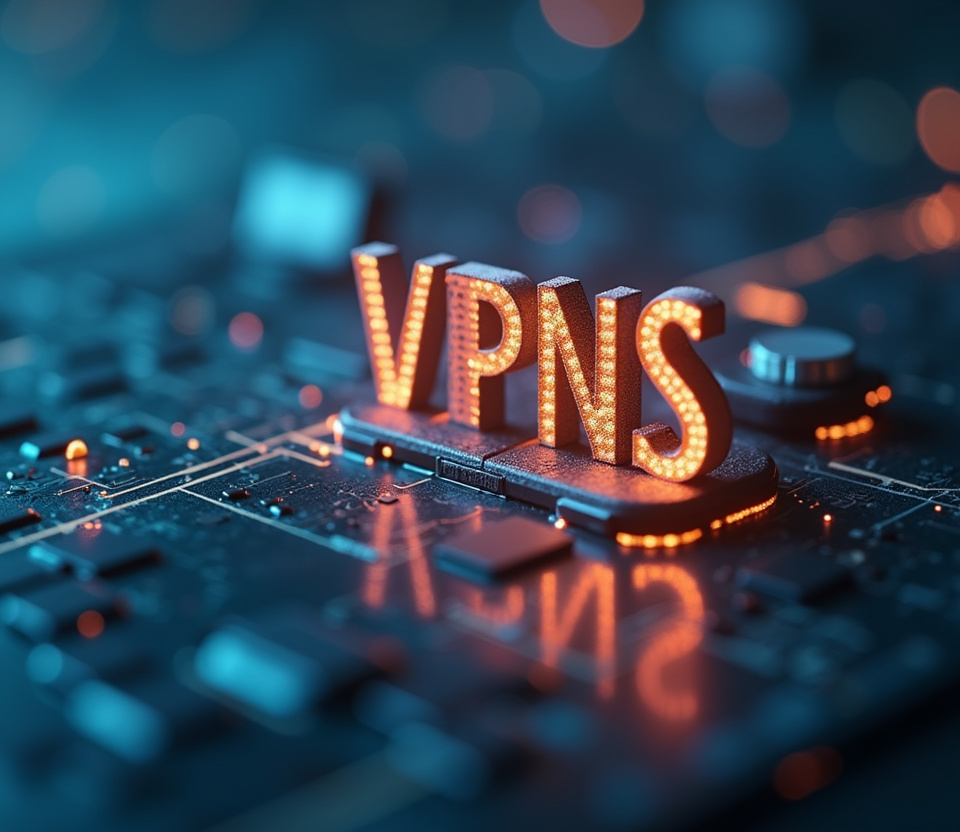VPNs for Remote Healthcare: Protecting Telehealth Data
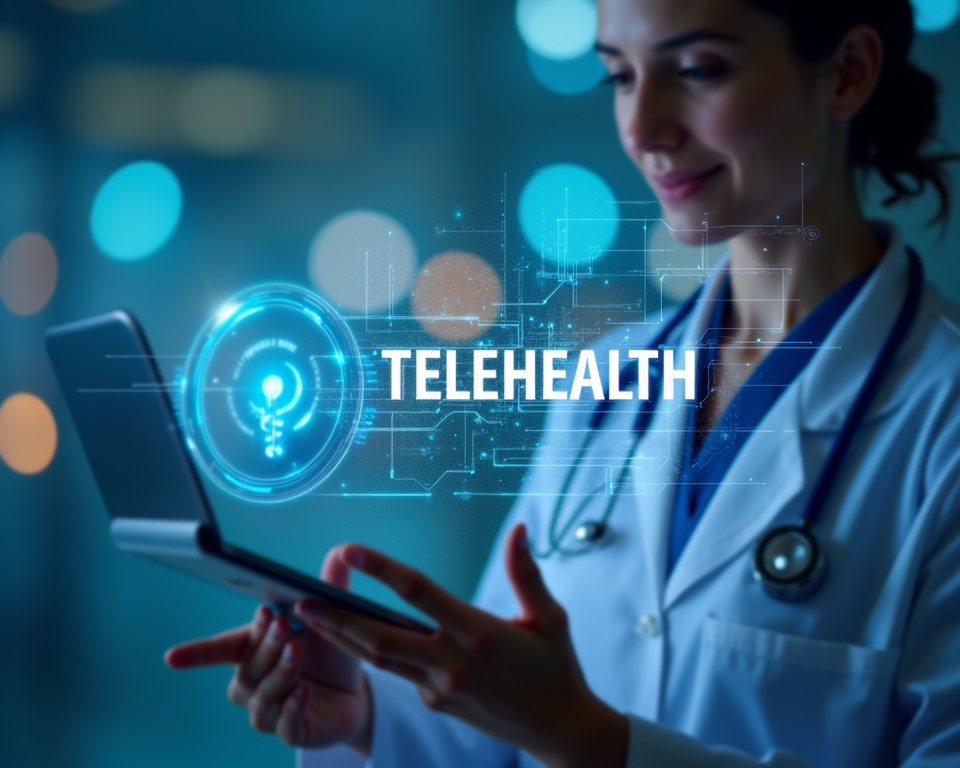
Table of Contents
Securing Telehealth: An Introduction to VPNs in Remote Healthcare
The convergence of healthcare and technology has ushered in an era of unprecedented accessibility and convenience through telehealth services. Virtual consultations, remote patient monitoring, and the secure exchange of electronic health records (EHRs) have become foundational elements of modern healthcare delivery. However, this digital transformation has also introduced significant cybersecurity challenges, particularly concerning the privacy and security of sensitive patient information.
As healthcare providers increasingly rely on remote access and virtual communication channels, the imperative for robust protection mechanisms becomes critical. A Virtual Private Network (VPN) emerges as an indispensable tool for safeguarding telehealth data, ensuring patient information protection and fostering trust in this evolving landscape. This article delves into the essential role VPNs play in securing remote healthcare operations.
Looking at the advantages, the selection criteria to use a VPN and the importance with compliance regulations as HIPAA. The core function of a remote healthcare VPN is to create an encrypted tunnel for data transmission across potentially insecure networks. This tunnel effectively shields sensitive patient information from unauthorized access and cyber threats.
The risk is particularly heightened when healthcare professionals and patients connect to telehealth platforms using public Wi-Fi networks in their homes, coffee shops, or other public spaces, as these networks are often vulnerable to hacking and data breaches. By deploying a VPN, all data transmitted is encrypted, rendering it unreadable to unauthorized parties who may attempt to intercept it. This encryption encompasses a wide range of sensitive data, including patient names, addresses, medical histories, diagnoses, treatment plans, and insurance details.
This encryption process essentially transforms the data into an unintelligible format, making it virtually useless to cybercriminals who may attempt to intercept it. Telehealth security is therefore fortified, ensuring that patient information remains confidential and protected from prying eyes. However, telehealth security extends beyond mere data encryption.
It necessitates a holistic approach to protecting patient information, encompassing various security measures such as stringent access controls, robust data loss prevention (DLP) strategies, and regular comprehensive security audits. A VPN plays a crucial role in enforcing access controls by ensuring that only authorized personnel can access sensitive data stored in EHRs or transmitted during virtual consultations. In conjunction with multi-factor authentication (MFA) and other advanced security protocols, VPNs contribute to a layered security architecture that significantly reduces the risk of unauthorized access.
Consider a scenario where a physician needs to access a patient's EHR remotely. With a VPN in place, the physician must first authenticate their identity using MFA before gaining access to the network. Once authenticated, the VPN encrypts all data transmitted between the physician's device and the EHR system, preventing unauthorized individuals from intercepting or tampering with the data.
Patient information protection is paramount, not only for complying with stringent regulations like HIPAA but also for maintaining the trust and confidence of patients, which underpins the entire healthcare system. Patients must have the unwavering assurance that their personal and medical information will be handled with the utmost care, confidentiality, and respect. Even a single breach of patient data can have devastating consequences, including significant financial losses, irreparable reputational damage, severe emotional distress for affected patients, and substantial legal liabilities for the healthcare organization.
By implementing a VPN as an integral component of a comprehensive telehealth security strategy, healthcare providers can unequivocally demonstrate their unwavering commitment to protecting patient privacy, upholding the integrity of their data, and building trust with their patients. The security of patients will dramatically improve. In the context of virtual consultations, a VPN ensures that all audio and video communications exchanged between healthcare providers and patients are encrypted and secure.
This prevents unauthorized individuals from eavesdropping on sensitive conversations or intercepting confidential information disclosed during the consultation. The utilization of a VPN cultivates a safe and confidential environment for virtual consultations, empowering patients to discuss their medical concerns openly and honestly, without any apprehension of privacy breaches. This is of paramount importance, as patients may be hesitant to share sensitive information if they fear that their privacy could be compromised.
A VPN for healthcare then is an essential component enabling private patient conversations, and improving trust for remote discussions.
VPN Functionality and Benefits: Ensuring Data Privacy in Telehealth
A VPN for healthcare delivers a multitude of crucial benefits that elevate telehealth security and strengthen patient information protection, thereby fostering a more secure and trustworthy environment for remote healthcare delivery. At its core, a VPN guarantees unwavering data confidentiality by encrypting all data transmitted between the healthcare provider and the patient, whether it's during a virtual consultation, accessing an EHR, or exchanging sensitive medical records. This robust encryption mechanism effectively prevents unauthorized access to sensitive information, even if the data is intercepted during transmission.
Imagine a scenario where a hacker manages to intercept data being transmitted between a healthcare provider and a patient. Without encryption, the hacker would be able to readily access the data and potentially steal sensitive patient information. However, with a VPN in place, the data is encrypted, rendering it unreadable to the hacker.
This ensures that patient information remains confidential and protected from unauthorized access. Data confidentially is thus always protected. Beyond confidentiality, a VPN also plays a pivotal role in enhancing data integrity.
It ensures that the data received by the intended recipient is precisely the same as the data sent by the originator, without any alteration or tampering during transmission. This is of paramount importance for maintaining the accuracy and reliability of patient information, as even minor alterations to medical records or treatment plans could have serious consequences for patient care. The VPN acts as a vigilant safeguard, actively preventing malicious actors from injecting false data into medical records or modifying existing entries.
This preserves the accuracy of patient data throughout the telehealth process, ensuring that healthcare providers can rely on the information they are using to make critical decisions about patient care. Moreover, a VPN facilitates secure remote access to telehealth platforms and electronic health records (EHRs), empowering healthcare providers to access patient information from any location, at any time, without compromising security. This secure remote access is especially beneficial for healthcare professionals who need to access patient data while traveling, working from home, or attending conferences.
In the absence of a VPN, accessing EHRs remotely could expose sensitive patient information to significant security risks. However, a VPN creates a secure and encrypted connection between the healthcare provider's device and the telehealth platform or EHR system, effectively preventing unauthorized access to sensitive data. This ensures that healthcare providers can access the information they need, when they need it, without putting patient privacy at risk.
Furthermore, a VPN plays a critical role in helping healthcare organizations comply with stringent regulations such as HIPAA. HIPAA mandates that healthcare providers take reasonable and appropriate measures to protect the privacy and security of patient information. A VPN can significantly contribute to meeting these requirements by providing a secure and encrypted connection for data transmission, thereby reducing the risk of data breaches and ensuring that patient information is protected in accordance with HIPAA regulations.
Consider a scenario where a healthcare organization is found to be in violation of HIPAA due to a data breach. The organization could face significant fines and penalties, as well as reputational damage that could be difficult to recover from. By implementing a VPN as part of their overall security strategy, healthcare organizations can demonstrate their commitment to complying with HIPAA regulations and protecting patient privacy.
Finally, a VPN provides enhanced security for mobile devices used in telehealth, which is becoming increasingly prevalent. Mobile devices, such as smartphones and tablets, are now widely used by both healthcare providers and patients for telehealth applications. However, these devices are often more vulnerable to security threats, such as malware, phishing attacks, and physical theft or loss.
A properly configured VPN can provide an extra layer of security for these devices by encrypting all data transmitted over the mobile network. This protects patient information from being compromised if the device is lost, stolen, or infected with malware. Therefore, for robust patient information protection, healthcare organizations must strategically invest in cutting-edge cybersecurity measures and rigorously train their staff on best practices for protecting patient data.
This includes implementing strong passwords, using multi-factor authentication, regularly updating software, and being vigilant against phishing attempts. A VPN for healthcare synergizes with these measures by providing an indispensable additional layer of security that protects data both at rest and during transmission, regardless of the location of the parties.
Selecting the Right VPN: Key Considerations for Healthcare Providers
When embarking on the selection process for a VPN solution tailored for telehealth, it is paramount to meticulously consider several key factors to ensure that the chosen solution aligns seamlessly with the specific needs and security requirements of your organization. A haphazard selection can lead to vulnerabilities and compromise the very patient information you aim to protect. One of the most critical considerations is the VPN's encryption strength, which serves as the foundation of its data protection capabilities.
Robust encryption protocols, such as Advanced Encryption Standard (AES) with a 256-bit key (AES-256), provide a high level of security for data transmission, making it exceedingly difficult for unauthorized parties to decrypt intercepted data. AES-256 is widely regarded as one of the strongest encryption algorithms available today, rendering it a preferred choice for securing sensitive healthcare data. In addition to robust encryption, it's essential to choose a VPN that supports multiple VPN protocols, such as OpenVPN, IKEv2/IPSec, and WireGuard.
These protocols offer varying levels of security, performance, and compatibility with different devices and operating systems. OpenVPN is a highly versatile and widely used open-source protocol known for its strong security and reliability. IKEv2/IPSec is another secure protocol often favored for its speed and stability, particularly on mobile devices.
WireGuard is a relatively new protocol that boasts impressive performance and streamlined code, making it an increasingly popular choice for VPNs. The ability to support multiple protocols allows you to select the protocol that best suits your specific needs and network environment. For instance, OpenVPN might be preferred for desktops and laptops due to its robust security, while IKEv2/IPSec might be more suitable for mobile devices due to its speed and stability.
Selecting a VPN provider that offers a strict no-logs policy is absolutely crucial for safeguarding patient privacy. A no-logs policy means that the VPN provider does not track, collect, or store any information about your online activity, including your IP address, browsing history, connection timestamps, data usage, and the websites you visit. This ensures that your data remains private and confidential, even from the VPN provider itself.
Some VPN providers claim to offer a no-logs policy but may still collect some limited information. To ensure genuine privacy, it's important to carefully review the VPN provider's privacy policy and look for independent audits or certifications that verify their no-logs claims. Trustworthy VPN providers often undergo third-party audits to demonstrate their commitment to privacy and transparency.
The VPN's server locations are another important factor to consider. Choose a VPN that has servers strategically located in multiple countries and regions around the world. This allows you to connect to a server that is geographically close to your location, which can improve performance and reduce latency, resulting in a smoother and more responsive telehealth experience.
Furthermore, having servers in multiple countries provides you with more flexibility for bypassing geographical restrictions and accessing content that may be blocked in your region. This can be particularly useful for healthcare providers who need to access medical journals, research databases, or other resources that may be restricted to certain countries. In addition, a wide distribution of servers ensures redundancy and availability, minimizing disruptions in case of server outages.
For instance, if a server in one location experiences technical issues, you can easily connect to a server in another location and continue your telehealth activities without interruption. Prioritize VPN solutions that offer features specifically designed for telehealth and healthcare environments. This may include support for HIPAA compliance, integration with EHR systems, and dedicated customer support for healthcare clients.
HIPAA compliance is essential for healthcare organizations that handle Protected Health Information (PHI). A VPN provider that is committed to HIPAA compliance will implement security measures to protect PHI and ensure that it is not disclosed to unauthorized parties. Integration with EHR systems can streamline workflows and improve efficiency by allowing healthcare providers to seamlessly access patient information from within the VPN connection.
Dedicated customer support for healthcare clients ensures that you have access to knowledgeable and responsive support personnel who understand the specific needs and challenges of the healthcare industry.
VPNs for Services: Enhancing Security and Privacy of Online Platforms
Implementing a VPN within a healthcare organization's telehealth infrastructure requires a well-defined strategy, careful planning, and adherence to established best practices to maximize its effectiveness and ensure seamless integration with existing systems. A phased rollout approach, starting with a pilot program involving a small group of users, is highly recommended. This allows for thorough testing, identification of potential issues, and refinement of the implementation plan before deploying the VPN across the entire organization.
During the pilot phase, it's crucial to gather feedback from users and address any concerns or challenges they may encounter. This iterative approach ensures that the VPN implementation is tailored to the specific needs of the healthcare organization and its users. Comprehensive training and education for all healthcare professionals and staff members who will be using the VPN are paramount.
This training should cover the basics of VPN technology, its purpose in protecting patient data, how to connect to the VPN securely, and best practices for maintaining security while using the VPN. Emphasize the importance of using strong passwords, avoiding public Wi-Fi networks without VPN protection, and reporting any suspicious activity immediately. Regular refresher training sessions should be conducted to reinforce these concepts and keep users up-to-date on the latest security threats and best practices.
Hands-on training exercises, such as simulated phishing attacks, can help users identify and avoid common security threats. Integrating the VPN with existing security infrastructure, such as firewalls, intrusion detection systems (IDS), and anti-malware solutions, is crucial for creating a layered security architecture. The VPN should be configured to work in conjunction with these other security measures to provide comprehensive protection against a wide range of threats.
For example, the firewall can be configured to allow only VPN-encrypted traffic, while the IDS can monitor VPN traffic for suspicious activity. Regular security audits and penetration testing should be conducted to identify and address any vulnerabilities in the system. These audits should assess the effectiveness of the VPN configuration, access controls, and other security measures.
Penetration testing involves simulating real-world attacks to identify potential weaknesses in the system and evaluate the organization's response capabilities. Strict access control policies should be implemented to ensure that only authorized personnel can access sensitive patient data through the VPN. Role-based access control (RBAC) is a widely used approach that grants users access only to the resources they need to perform their job duties.
For example, a physician may have access to patient medical records, while a billing clerk may only have access to billing information. Multi-factor authentication (MFA) should be enabled for all VPN users to provide an additional layer of security. MFA requires users to provide two or more authentication factors, such as a password and a one-time code generated by a mobile app, before gaining access to the VPN.
This significantly reduces the risk of unauthorized access, even if a user's password is compromised. Continuous monitoring and logging of VPN activity are essential for detecting and responding to security incidents. VPN logs should be regularly analyzed to identify any suspicious patterns, such as unusual login attempts, large data transfers, or unauthorized access attempts.
Security information and event management (SIEM) systems can automate this process by collecting and analyzing security logs from various sources, including the VPN, firewalls, and intrusion detection systems. SIEM systems can also generate alerts when suspicious activity is detected, allowing security personnel to respond quickly to potential threats. A well-defined incident response plan should be in place to guide the organization's response to security incidents involving the VPN.
This plan should outline the steps to be taken to contain the incident, investigate the cause, and restore normal operations. The incident response plan should be regularly tested and updated to ensure its effectiveness. Regular updates and patching of the VPN software and firmware are crucial for addressing security vulnerabilities.
VPN vendors frequently release updates to address newly discovered vulnerabilities. These updates should be applied promptly to protect the system from exploitation. A patch management system can automate this process by scanning for vulnerabilities and deploying patches to VPN devices automatically.
By diligently adhering to these implementation strategies and best practices, healthcare organizations can derive maximum benefit from their VPN investments, fortifying telehealth security, protecting patient information, and cultivating a secure and trustworthy environment for remote healthcare delivery.
In conclusion, the integration of VPN technology into remote healthcare operations is no longer a mere option but a fundamental necessity for ensuring the confidentiality, integrity, and availability of sensitive patient data. As telehealth continues to expand its reach and impact on healthcare delivery, the risks associated with cyberattacks and data breaches will only intensify, making robust security measures even more critical. A well-implemented VPN solution, coupled with a comprehensive security strategy, provides a strong defense against these threats, safeguarding patient information and fostering trust in the telehealth ecosystem.
Throughout this article, we have explored the various benefits of using a VPN for healthcare, including enhanced data encryption, secure remote access, regulatory compliance, and improved mobile device security. We have also discussed key considerations for selecting a VPN solution, such as encryption strength, protocol support, no-logs policies, and server locations. Furthermore, we have outlined best practices for implementing and managing a VPN within a healthcare organization, emphasizing the importance of comprehensive training, integration with existing security infrastructure, strict access control policies, and continuous monitoring.
The adoption of VPNs in telehealth aligns directly with the principles and requirements of HIPAA, which mandates that healthcare providers implement reasonable and appropriate safeguards to protect the privacy and security of protected health information (PHI). A VPN helps healthcare organizations meet these requirements by providing a secure and encrypted channel for transmitting PHI electronically, reducing the risk of unauthorized access and disclosure. However, it's important to note that implementing a VPN alone is not sufficient for achieving HIPAA compliance.
Healthcare organizations must also implement other administrative, physical, and technical safeguards to protect PHI, such as employee training, access controls, physical security measures, and data backup and recovery procedures. A comprehensive approach to HIPAA compliance is essential for protecting patient privacy and avoiding costly penalties. The future of telehealth security will likely involve even more sophisticated security technologies and strategies.
As cyber threats evolve, VPNs will need to adapt and incorporate new features to stay ahead of the curve. This may include the use of artificial intelligence (AI) and machine learning (ML) to detect and respond to threats in real-time, as well as the integration of blockchain technology to enhance data integrity and transparency. Furthermore, the increasing adoption of cloud-based telehealth platforms will require healthcare organizations to carefully evaluate the security of their cloud providers and implement appropriate security measures to protect patient data stored in the cloud.
Cloud-based VPN solutions can provide an extra layer of security for data transmitted to and from the cloud. Ultimately, the success of telehealth depends on building and maintaining trust with patients. Patients need to feel confident that their personal and medical information is being handled securely and responsibly.
A data breach can erode this trust and have devastating consequences for both patients and healthcare providers. By investing in robust security measures, such as VPNs, and prioritizing patient privacy, healthcare organizations can foster a culture of trust and ensure the long-term sustainability of telehealth. As telehealth continues to transform healthcare delivery, it is imperative that security remains at the forefront of our priorities.
By embracing VPN technology and implementing comprehensive security strategies, we can unlock the full potential of telehealth while protecting patient information and building a more secure and trustworthy healthcare ecosystem.
Stay Updated
Get the latest VPN news, tips, and exclusive deals to your inbox.
